This entry isn't going to be one of my picture-heavy, multimedia extravaganzas. It's just a little story about a high school student named Karen Funk, on the night on one last high school humiliation. I'll try to make the story uplifting. Or something.

Fayetteville-Manlius Central High School in Manlius, NY has always been considered an academically superior public school, populated by privileged suburban kids. That's probably a fair assessment, but I was never all that fond of the place. I was fat, shy, smart, a little awkward socially, and not at all fashionably dressed. I wore a lot of polyester, partly because this was the 1970s, but mostly because that was the kind of clothing my mom liked. She therefore bought for me, to the exclusion of all else. The only shred of pride I had in my appearance came from the jeans that I bought for myself, and wore as often as possible.
It would not be true to say that I'd known the kids in my graduating class all my life, or even since kindergarten. For one thing, there were many comings and goings of families, transferred in and out by GE, or moving around for other reasons. Some of the kids I graduated with were certainly there by second grade or so, but not all that many. But the main reason it would not be true to say that we'd known each other for many years was that they didn't really know me, and I didn't really know them. I probably know Carly and Becky, neither of whom I've ever met in person, better than I ever knew Jack or Tom, Sharon, Cheryl or... well, to give any more appropriate examples, I'd have to dig out my high school yearbook again.
A quick anecdote will serve to illustrate the point, before I move on to tonight's main story. I was in the high school choir, but I was never good enough to make the Swing Sixteen singing group, or do solos or anything like that. I think I made the Choraliers, but I don't remember for sure. But I did audition for All-County Chorus and make it, twice; and once I got into Area All State, auditioning with Sunrise, Sunset.
That year, the Area All State concert was held in Fulton, NY, home of a Nestle factory. It was only 37 miles from Manlius, Google tells me, but it seemed more like 75. It was far enough that I stayed overnight at the home of a kid in the choir who lived in Fulton, as did all the other kids from F-M who made the trip.
My visit with the girl from Fulton and her family was pleasant enough, but the following evening before concert time, I had a problem. My peers were washing their hair in the school bathrooms, putting on nice clothes, and doing their make-up. I became acutely aware that my hair needed washing, but I had no shampoo, and didn't dare ask to borrow any. I just brushed through it with water, and hoped it would help a little.
But even that wasn't the main problem. My parents always came to my concerts, and this was my most important concert ever. Where were they? I couldn't find them in the crowd.
Concert time came. I scanned the crowd as the rest of the choir and I sang selections from Godspell, conducted by the famous choir director Gregg Smith. There was no sign of my parents. The concert ended. No parents. Kids were leaving with their families. Not me. I would have taken the school bus back, but they'd deliberately not provided one, in order to make the parents come to the concert.
I called home on a pay phone. My mom was there. She explained that they'd been to all my concerts, but since this one was so far away, they'd decided to sit it out. She was distraught to hear that I was both disappointed and stranded.
Enter a couple who were about the last parents from Manlius to leave the concert. They gave me a ride home. Their son was one of those obnoxious boys who liked to stand in the hall outside the cafeteria, and make rude remarks to passersby. But in the car with his parents, he was a perfectly nice, intelligent guy, with college plans and everything. I even kind of liked him.
At school on Monday, of course, he turned back into a jerk. If anything, he was even more obnoxious. But now I knew his secret: he was only human after all, more complex than his hallway behavior would indicate.
But high school society doesn't deal much in complexities. The other kids knew how I looked, and how I reacted to teasing, that I was smart, and that I liked Star Trek. Some of them probably remembered the skunk incident from second grade, and other social gaffes I'd made over the years. That was all they needed to know about me.
Now, if I'd been more self-confident, more socially savvy, I could maybe have laughed off any teasing, taken more care with my appearance, worked to overcome my shyness, and made some friends. A perusal of my yearbook shows a lot of kids that I barely remember, or remember only as being smart and nice. But I never got to know them, any more than they got to know me. In some ways, things haven't changed that much since then. How many people at my company, or my church, know about my novels? And how much do I know about their lives? Not much, in most cases.
But I digress.
There was a nasty little tradition at F-M, in which the senior class put on a little awards ceremony, the F-Emmys. I was nominated in two categories: Most Likely to Succeed and the Gladys Ormphby Award.
 For those of you who may be too young to remember, or who didn't watch tv in the late 1960s and early 1970s, Gladys was Ruth Buzzi's most famous character on Laugh-In. She wore a hairnet, a big brown sweater, a big brown skirt, oversized hose that gathered around her ankles, and oversized shoes. She was quintessentially frumpy, and had an amazing woeful frown.
For those of you who may be too young to remember, or who didn't watch tv in the late 1960s and early 1970s, Gladys was Ruth Buzzi's most famous character on Laugh-In. She wore a hairnet, a big brown sweater, a big brown skirt, oversized hose that gathered around her ankles, and oversized shoes. She was quintessentially frumpy, and had an amazing woeful frown.
The series of sketches she used to appear in had a simple premise. Arte Johnson's Dirty Old Man character, Tyrone F. Horneigh, would sit beside her on a park bench, forcing her to move over to avoid him. He would, of course, scoot closer. Then he would try some strange, silly, relatively innocent pick-up line on her, something that sounded filthy but wasn't. She would hit him with her purse. He'd say something else. She would hit him again. This would continue until he fell off the bench.
Being named the class Gladys Ormphby was the most insulting award in the whole ceremony.
In a way, though, I'd invited the comparison. Dan Cheney and I had done a sketch in 10th or 11th grade, in which he was Bobby Fischer and I was kind of a Gladys character. I played chess with him in order to win a date with him - and I won using Fool's Mate. The punchline was, "There won't be any cameras, will there?"
For this reason and others, I fully expected to win the Gladys Ormphby award. I hoped to win Most Likely to Succeed as well. I decided to make the best of the situation, and laugh along with the class, instead of letting myself be hurt by this.
That was the plan, anyway.
I dressed almost as I had dressed for the sketch. I even carried a bunch of school books, so I could struggle and drop some as I came up for the award. I chickened out of going all the way with it, though. And as I came up the aisle, the auditorium was filled with catcalls and rude remarks.
My prepared speech was this: "I can't imagine why you chose me for this award." I don't think I ever delivered it. I was too demoralized by the walk up the aisle.
Part two of the plan was to ditch the frumpy clothes after that, and collect the Most Likely to Succeed Award with grace and confidence.
Somebody else won. What can I say? It was a bad night for me. And the faculty sponsor, one of my former French teachers, thought it was all in good fun.
But here's the thing. If I'd learned how to take teasing and give it back without feeling crushed, if I'd made more friends within my graduating class, if I'd paid a bit more attention to the outward appearance stuff I disdained as being shallow and unimportant, that night would have been very different for me. Too bad it took me 20 more years after graduation to learn this.
At my office now, there's a guy who teases me at least twice a week about the one part of my job that is excruciatingly tedious. He's basically a good guy, and I mostly take his teases with minimal annoyance. Only once have I been hurt by what he said, when he kind of crossed the line. Even then, I didn't act like high schooler Karen Funk. I handled it, and then griped to someone else later in order to vent.
Take that, Gladys.
Karen
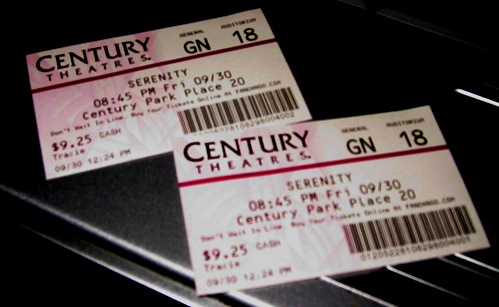

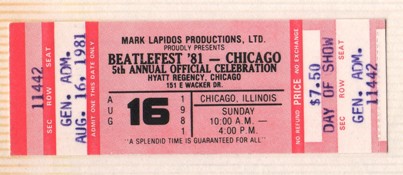 As I've mentioned repeatedly in this journal, John, Kal and I were the owners of Rockarama from 1979 to 1982. The store never made money, so we kept it going by hauling our best stock to record shows. Most of these were in Cleveland, Pittsburgh, Columbus, Detroit, Toledo and Covington. A couple of times, though, we went to Beatlefest. In 1981 it was the Chicago Beatlefest. In 1982, it was the one in Port Chester, NY, not far from New York City. In 1987 and 1990, when Rockarama was long gone, we attended the Beatlefest in downtown Los Angeles.
As I've mentioned repeatedly in this journal, John, Kal and I were the owners of Rockarama from 1979 to 1982. The store never made money, so we kept it going by hauling our best stock to record shows. Most of these were in Cleveland, Pittsburgh, Columbus, Detroit, Toledo and Covington. A couple of times, though, we went to Beatlefest. In 1981 it was the Chicago Beatlefest. In 1982, it was the one in Port Chester, NY, not far from New York City. In 1987 and 1990, when Rockarama was long gone, we attended the Beatlefest in downtown Los Angeles.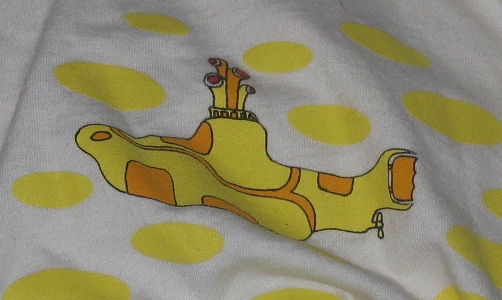 Now, honestly, I don't remember much about that first Beatlefest I attended. I remember how green and pretty the drive to the hotel was, and that we sawsome kind of light rail on the way in and were impressed with it. The hotel itself was the Hyatt Regency Chicago. It had a mezzanine level, and that made me a little nervous. A month before, almost to the day, the Skywalk mezzanine at the Hyatt Regency Kansas City had collapsed, killing 119 people. Nothing bad happened at the Chicago hotel, though. The room even had a mini-refrigerator, which was the first time I'd seen one in a hotel room.
Now, honestly, I don't remember much about that first Beatlefest I attended. I remember how green and pretty the drive to the hotel was, and that we sawsome kind of light rail on the way in and were impressed with it. The hotel itself was the Hyatt Regency Chicago. It had a mezzanine level, and that made me a little nervous. A month before, almost to the day, the Skywalk mezzanine at the Hyatt Regency Kansas City had collapsed, killing 119 people. Nothing bad happened at the Chicago hotel, though. The room even had a mini-refrigerator, which was the first time I'd seen one in a hotel room.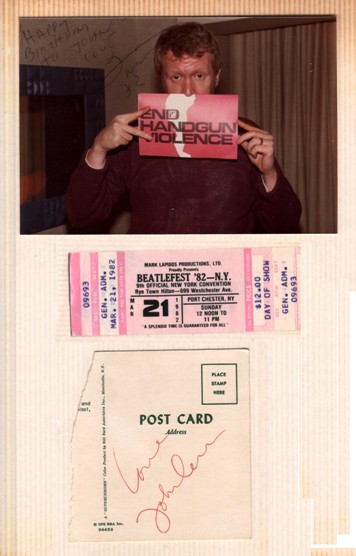 Too bad, because I wanted to tell you about
Too bad, because I wanted to tell you about 
 I called out my thanks to the second person who honked at me, and stood helplessly on the curb as the early afternoon traffic plowed through my unintentional litter, blowing it southward and covering it with treadmarks. When the light changed again, I grabbed the two pieces that were still within reach of the original crosswalk. The light changed yet again, and I retrieved several more papers, in and around the crosswalk that went the other way. That left two more unretrieved items, both in the scariest, most dangerous part of the intersection. Everything I'd grabbed turned out to be a blank white envelope (now punctured and gray), and the remaining items looked to be more of the same. I therefore didn't try for those last two pieces. I stuffed the other ruined envelopes in the bag, and returned to my cubicle.
I called out my thanks to the second person who honked at me, and stood helplessly on the curb as the early afternoon traffic plowed through my unintentional litter, blowing it southward and covering it with treadmarks. When the light changed again, I grabbed the two pieces that were still within reach of the original crosswalk. The light changed yet again, and I retrieved several more papers, in and around the crosswalk that went the other way. That left two more unretrieved items, both in the scariest, most dangerous part of the intersection. Everything I'd grabbed turned out to be a blank white envelope (now punctured and gray), and the remaining items looked to be more of the same. I therefore didn't try for those last two pieces. I stuffed the other ruined envelopes in the bag, and returned to my cubicle. Whew!
Whew!


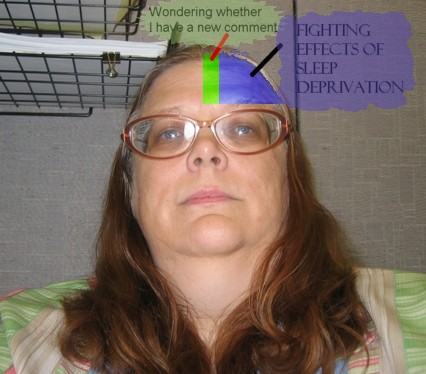 This is my entry in this week's
This is my entry in this week's  But: despite my mania for online confession, you don't know everything about me. Some of it's deep dark stuff I don't tell anyone (except maybe John or my doctor), but a lot of it is basic personal data. With a few exceptions, you don't know my address or phone number, the name of the company where I work now (or the kind of business it is), or the name of the company where John works. You sure as heck don't know my credit card numbers and financial data. Again with exceptions, you don't know the name of my Wiccan friend with health problems, or what's going on in her life now. You may know that I go to church with a guy named Kevin, but you probably don't know who that is. And so on. You know what I choose to share. I share an awful lot, but not everything. And if I don't volunteer every negative thing I could possibly say about myself, who can blame me? So you're getting a slightly grainy and rosy picture of me, and there are pieces missing.
But: despite my mania for online confession, you don't know everything about me. Some of it's deep dark stuff I don't tell anyone (except maybe John or my doctor), but a lot of it is basic personal data. With a few exceptions, you don't know my address or phone number, the name of the company where I work now (or the kind of business it is), or the name of the company where John works. You sure as heck don't know my credit card numbers and financial data. Again with exceptions, you don't know the name of my Wiccan friend with health problems, or what's going on in her life now. You may know that I go to church with a guy named Kevin, but you probably don't know who that is. And so on. You know what I choose to share. I share an awful lot, but not everything. And if I don't volunteer every negative thing I could possibly say about myself, who can blame me? So you're getting a slightly grainy and rosy picture of me, and there are pieces missing.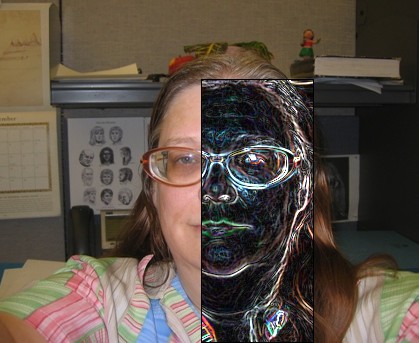 Life in this modern world is compartmentalized, and we interact with different populations at different times, sharing some things and keeping others secret. Nobody at my office knows that I am a blogger--at least, I hope not. Although I strive to avoid revealing anything that would compromise confidentiality agreements, and never write blog entries at work (as I did a few times at Worldwide Travel, I'm ashamed to say), it's better not to raise the issue than explain what a blog is, and why the company need not be concerned about it. Hardly anyone at work knows about the novels. The few who do are the ones who asked about the Sherlock portraits of my characters, which are posted in my cubicle. Nobody there has heard of my friend Kevin, and not too many have even heard of John. But they do know stuff you guys don't about what I do all day and why and how, and how it fits in with their own jobs, and how I look when I return from lunch on a muggy day, my hair all droopy and messy from the walk across the street. A few of them hear things even John doesn't know. (Not very many things, though - John doesn't miss much!)
Life in this modern world is compartmentalized, and we interact with different populations at different times, sharing some things and keeping others secret. Nobody at my office knows that I am a blogger--at least, I hope not. Although I strive to avoid revealing anything that would compromise confidentiality agreements, and never write blog entries at work (as I did a few times at Worldwide Travel, I'm ashamed to say), it's better not to raise the issue than explain what a blog is, and why the company need not be concerned about it. Hardly anyone at work knows about the novels. The few who do are the ones who asked about the Sherlock portraits of my characters, which are posted in my cubicle. Nobody there has heard of my friend Kevin, and not too many have even heard of John. But they do know stuff you guys don't about what I do all day and why and how, and how it fits in with their own jobs, and how I look when I return from lunch on a muggy day, my hair all droopy and messy from the walk across the street. A few of them hear things even John doesn't know. (Not very many things, though - John doesn't miss much!)
 Still, I'm not a very secretive person by nature. Although I haven't said outright where I live or where I work, I haven't exactly covered my tracks well. Here's a picture of the hallway outside the accounting department at work, taken when I left just before sunset one evening. If you worked there, you'd recognize the hall. Even if you didn't work there, but you lived in Tucson, you could deduce where I work from the pictures I've posted of weather and mountains and streets and buildings. You'd know that I must live near that one Safeway I keep mentioning. So what is the point of my saying I live on Calle *Mumble*?. I'm not sure. But basic Internet security guidelines suggest that I not post my address, so I don't. Maybe I get 1% less junk mail that way. And it is true that a whacko from Quantum Leap fandom once used my address against me - to sign me up for a subscription to Playgirl. It wasn't exactly a tragic consequence of my openness, but it was annoying. I really don't like that magazine at all.
Still, I'm not a very secretive person by nature. Although I haven't said outright where I live or where I work, I haven't exactly covered my tracks well. Here's a picture of the hallway outside the accounting department at work, taken when I left just before sunset one evening. If you worked there, you'd recognize the hall. Even if you didn't work there, but you lived in Tucson, you could deduce where I work from the pictures I've posted of weather and mountains and streets and buildings. You'd know that I must live near that one Safeway I keep mentioning. So what is the point of my saying I live on Calle *Mumble*?. I'm not sure. But basic Internet security guidelines suggest that I not post my address, so I don't. Maybe I get 1% less junk mail that way. And it is true that a whacko from Quantum Leap fandom once used my address against me - to sign me up for a subscription to Playgirl. It wasn't exactly a tragic consequence of my openness, but it was annoying. I really don't like that magazine at all. When I was in high school, or possibly junior high, I came up with a premise for a story about an alien from a planet where everyone has telepathy. When he visited Earth, he could not understand why people had any need or desire for privacy. Knowing everyone at home so intimately, he understood them completely, why they did what they did and how they felt about everything. There was no miscommunication, no misunderstanding. And because everyone understood each other, they empathised with each other. Everyone's feelings were important to everyone, because they all felt them. In a situation like that, how could anyone seek to hurt or judge anyone else? Secrets were both impossible and unnecessary.
When I was in high school, or possibly junior high, I came up with a premise for a story about an alien from a planet where everyone has telepathy. When he visited Earth, he could not understand why people had any need or desire for privacy. Knowing everyone at home so intimately, he understood them completely, why they did what they did and how they felt about everything. There was no miscommunication, no misunderstanding. And because everyone understood each other, they empathised with each other. Everyone's feelings were important to everyone, because they all felt them. In a situation like that, how could anyone seek to hurt or judge anyone else? Secrets were both impossible and unnecessary.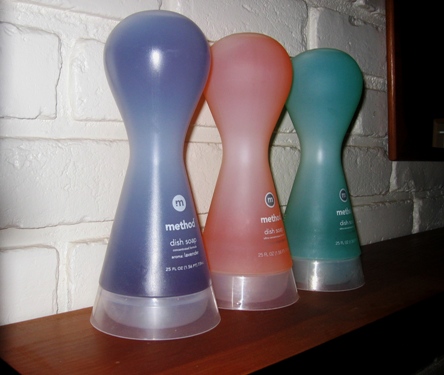
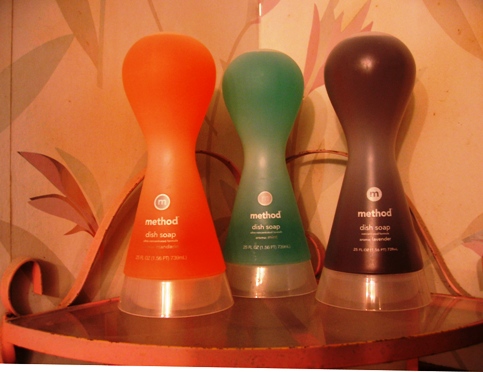

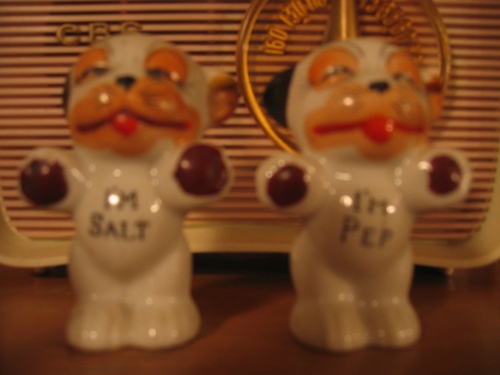

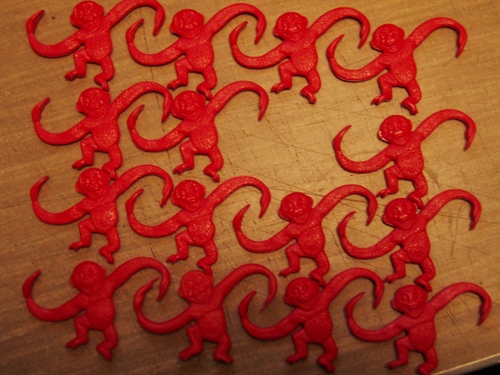

 For those of you who may be too young to remember, or who didn't watch tv in the late 1960s and early 1970s, Gladys was Ruth Buzzi's most famous character on Laugh-In. She wore a hairnet, a big brown sweater, a big brown skirt, oversized hose that gathered around her ankles, and oversized shoes. She was quintessentially frumpy, and had an amazing woeful frown.
For those of you who may be too young to remember, or who didn't watch tv in the late 1960s and early 1970s, Gladys was Ruth Buzzi's most famous character on Laugh-In. She wore a hairnet, a big brown sweater, a big brown skirt, oversized hose that gathered around her ankles, and oversized shoes. She was quintessentially frumpy, and had an amazing woeful frown. 


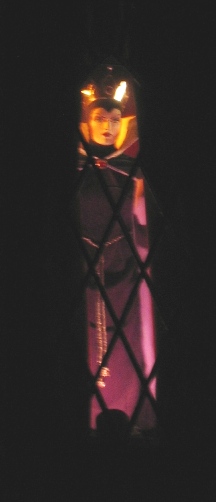 Promo Number Two: "Are You a Heroine or a Villainess?" has the following stats to this point:
Promo Number Two: "Are You a Heroine or a Villainess?" has the following stats to this point:


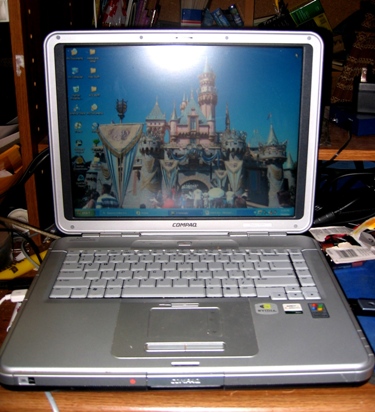
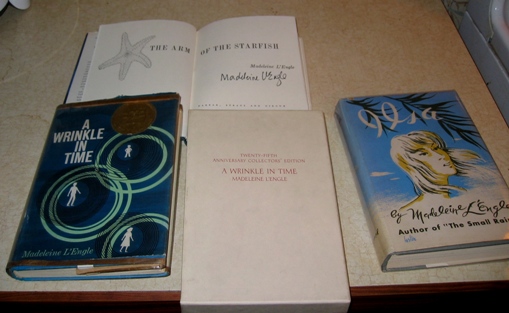 Six L'Engle books: Ilsa, two particular copies of A Wrinkle in Time, two hardback copies of The Arm of the Starfish, and a hardback first edition of A Ring of Endless Light. Ilsa is the rarest L'Engle novel, having been out of print since the late 1940s. (It's a deeply unsatisfying book, and L'Engle herself doesn't like it much. Hence, no republication.) One of the Starfish copies is a first edition from 1965, and the other is autographed. I don't remember getting that autograph, or buying an autographed copy, but there it is. It's definitely her handwriting. I do remember when she autographed A Ring of Endless Light for me, the only time I ever met her. My Wrinkle with the classic blue cover is an 11th printing from 1965, and the signed, boxed edition was limited to 500 copies when it came out in 1987. Mine is #169.
Six L'Engle books: Ilsa, two particular copies of A Wrinkle in Time, two hardback copies of The Arm of the Starfish, and a hardback first edition of A Ring of Endless Light. Ilsa is the rarest L'Engle novel, having been out of print since the late 1940s. (It's a deeply unsatisfying book, and L'Engle herself doesn't like it much. Hence, no republication.) One of the Starfish copies is a first edition from 1965, and the other is autographed. I don't remember getting that autograph, or buying an autographed copy, but there it is. It's definitely her handwriting. I do remember when she autographed A Ring of Endless Light for me, the only time I ever met her. My Wrinkle with the classic blue cover is an 11th printing from 1965, and the signed, boxed edition was limited to 500 copies when it came out in 1987. Mine is #169.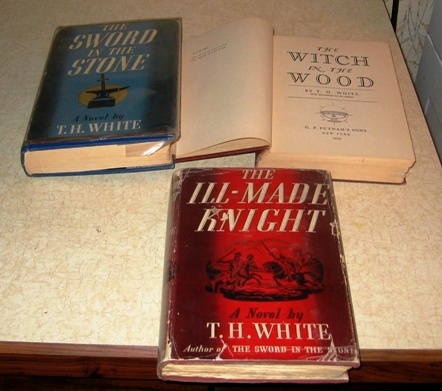 In the section about The Once and Future King, a book that spawned both the musical Camelot and Disney's animated feature The Sword in the Stone, Carter quoted a number of great scenes, most memorably a hilarious attempt by King Pellinore to write a love poem to a woman called Piggy. I loved it so much that I bought a paperback copy of White's magnum opus to take on vacation with me that summer. Funny thing: that scene wasn't there! Carter had quoted from scenes that White had deleted from the three original, stand-alone books - The Sword in the Stone, The Witch in the Wood and The Ill-Made Knight - when he crammed them together with a short fourth volume to become The Once and Future King. I think it took me about eight years, and John's help, to track down copies of the second and third books in the series. They've been out of print for 60 years now. In particular, The Witch in the Wood is very different from the second part of the combined novel, retitiled The Queen of Air and Darkness.
In the section about The Once and Future King, a book that spawned both the musical Camelot and Disney's animated feature The Sword in the Stone, Carter quoted a number of great scenes, most memorably a hilarious attempt by King Pellinore to write a love poem to a woman called Piggy. I loved it so much that I bought a paperback copy of White's magnum opus to take on vacation with me that summer. Funny thing: that scene wasn't there! Carter had quoted from scenes that White had deleted from the three original, stand-alone books - The Sword in the Stone, The Witch in the Wood and The Ill-Made Knight - when he crammed them together with a short fourth volume to become The Once and Future King. I think it took me about eight years, and John's help, to track down copies of the second and third books in the series. They've been out of print for 60 years now. In particular, The Witch in the Wood is very different from the second part of the combined novel, retitiled The Queen of Air and Darkness.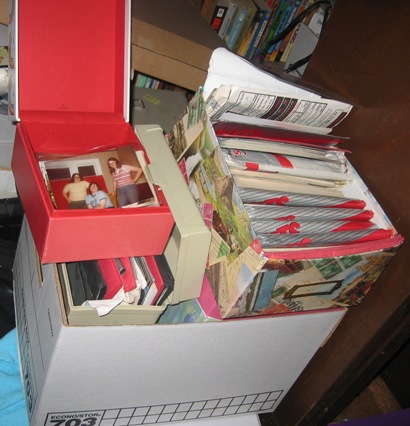 3. A box of photos. Since starting this blog, I've really come to appreciate my collection of old photos. Some of them are from my childhood and college years, some from early days of our marriage, and a lot are of Tucson, Disneyland and Walt Disney World. A handful belonged to my mom, and in some cases go back sixty years or more. It distresses me to see how many have melted or otherwise become damaged over the years, particularly my Polaroids.
3. A box of photos. Since starting this blog, I've really come to appreciate my collection of old photos. Some of them are from my childhood and college years, some from early days of our marriage, and a lot are of Tucson, Disneyland and Walt Disney World. A handful belonged to my mom, and in some cases go back sixty years or more. It distresses me to see how many have melted or otherwise become damaged over the years, particularly my Polaroids.


 Aside from my usual coy obscuring of text, this was the scene in my cubicle at work, about three hours ago. The time: 9:30 PM.
Aside from my usual coy obscuring of text, this was the scene in my cubicle at work, about three hours ago. The time: 9:30 PM.
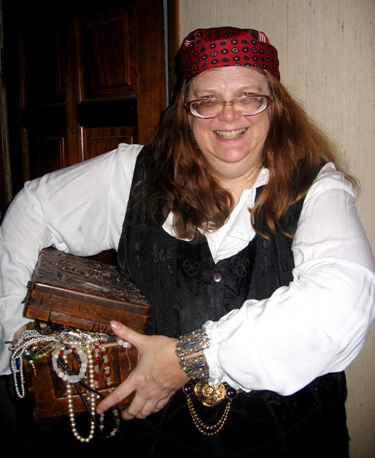
 Portraits by Jolly John Blocher, Scourge o' the Missing Sea!
Portraits by Jolly John Blocher, Scourge o' the Missing Sea!
 One more curiosity about our Katie. She be the only scurvy dog aboard who never takes a drop o' rum. Funny thing - last time we took on a cache o' Her Majesty's finest, I woke the next day with me purse a mite lighter than I thought it were afore. D'yer think maybe...nah!
One more curiosity about our Katie. She be the only scurvy dog aboard who never takes a drop o' rum. Funny thing - last time we took on a cache o' Her Majesty's finest, I woke the next day with me purse a mite lighter than I thought it were afore. D'yer think maybe...nah!





 Artist / Imagineer Marc Davis
Artist / Imagineer Marc Davis

 You are looking at an archive edition of
You are looking at an archive edition of 


